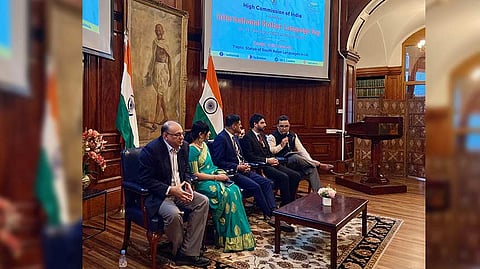

A memorandum presented by representatives of the Indian diaspora communities calling for the inclusion of major Indian languages in the British school curriculum marked celebrations of the United Nations Educational, Scientific and Cultural Organisation (UNESCO) designated International Mother Language Day in London this week.
The memorandum, presented by Harmeet Singh Bhakna of the Punjabi Language Awareness Board UK and C.K. Naidu of the Sanathan Sanstha UK, calls for Hindi, Punjabi, Urdu, Bengali, Gujarati, Tamil, Telugu, Malayalam, Marathi and Nepali within the school curriculum. All of these languages are the top South Asian languages logged as commonly spoken in England, as per the 2021 census. The memo is addressed to the Department of Education and Secretary of State Gillian Keegan and argues that such a move would foster better understanding between the UK and South Asia.
Indian High Commissioner to the UK Vikram Doraiswami said: “We in India are a nation of many languages. Each of these is justly celebrated, not just in our currency notes, not just in our music, not just in our folk lore, it is celebrated in every sense… through signage, through literature, and through films.
“It has made India what it is – the world’s most multicultural country. And, the Indian diaspora are the people who have brought those languages, that culture here… celebrating your links to your ancestral homeland in South Asia through language. Your efforts to sustain and protect your language and take it forward through your children and your grandchildren will be your legacy.”
MORE LIKE THIS…
A musical rendition of the famous multilingual song ‘Mile Sur Mera Tumhara’ at the diaspora gathering at the Indian High Commission in London was followed by a panel discussion entitled ‘Status of South Asian Languages in the UK’, chaired by Nehru Centre Director and author Amish Tripathi.
The theme of the 2023 International Mother Language Day, which falls annually on February 21, is “Multilingual education – a necessity to transform education”. According to the UN, multilingual education based on mother-tongue facilitates access to and inclusion in learning for population groups that speak non-dominant languages, languages of minority groups and indigenous languages.
It was proclaimed by the General Conference of UNESCO back in 1999 as an initiative of Bangladesh, marking the anniversary of the day in 1952 when the people of Bangladesh – then East Pakistan – fought for recognition for the Bengali language.